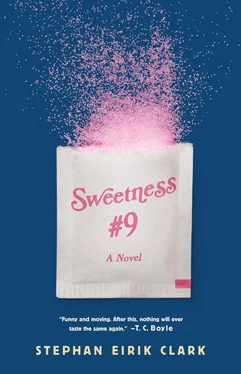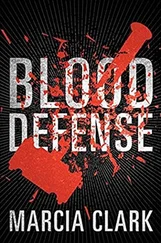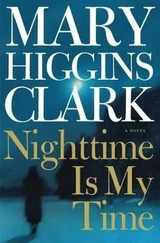Whitman was an honor student and an ex-marine. He held the observation deck for ninety-six minutes, wounding thirty-one and killing thirteen, including a pregnant woman and a Peace Corps trainee. It was ninety-eight degrees out, and in his footlocker there were weapons both primitive (a hatchet, a hammer, a hunting knife) and modern: a Magnum.357 Smith & Wesson revolver, a 6mm Remington bolt-action rifle with a four-power Leupold scope, a.30-caliber M1 carbine, and the sawed-off twelve-gauge shotgun, bought at Sears, Roebuck, which he used on my parents while I was furtively masturbating in the library.
“My father took the stairs,” I said in my booth at the Mobil station, as the heavily accented tourist, maybe a Frenchman or an Italian, stood puzzling over the dimes he thought were nickels and the nickels he thought were dimes. “Whitman had been complaining of headaches, you know. Left a letter asking that an autopsy be performed. Thought science might be able to learn from him. It’s remarkable, isn’t it? Off to do what he did, and still thinking of the public good.”
The tourist smiled as only a foreigner can, perhaps not understanding more than one out of every three words that I said; then he was gone and another customer had taken his place. I reached for the flexible neck of my microphone and continued as if he’d heard it all.
“And they did find a tumor, you know. About the size of a walnut. Take a guess where.” It had started to snow. The world was spinning around me as I sat motionless on that stool. “Right here.” I tapped at my skull. “In the part of the brain responsible for emotional associations with memory.”
The customer gave me his credit card. I laid it down in the manual imprinter, then placed a carbon over it. “But this is what gets me most,” I said. “He wore a white headband. Can you believe it? Up there on the clock tower, a marksman, an ex-marine, wearing a headband. What could be more terrifying?”
I spoke non sequiturs much of that evening, to one driver after another:
“Of course, it’s not just the limbic system that’s associated with emotion and memory. If you’ve read your French literature, you know the power of a good biscuit.”
“Spam, canned food, deodorant. Who can say what causes these things?”
“Some say it must’ve been the saccharin in his diet soda. In the letter he left for the police, he said he drank more than six cans of Tab a day. Do you think that’s too much?”
I finally lost my balance and fell to the floor, the stool ricocheting against the wall and dropping on top of me like a wrestler going for the pin. My breathing slowed and became more shallow. White flakes of dandruff spiraled down through a slant of light, growing as large in my eyes as the snowflakes falling outside. Then a man rapped his keys against the thick sheet of glass, and a voice came tumbling down over me like an echo in a cave, the accent from Staten Island or Brooklyn.
“You all right down there? We gonna need an ambulance? I need a fuckin’ fill-up on three!”
WHEN I CAME TO, a man in a saucer-shaped hat stood over me, crouched down like a referee ready to count a boxer out.
“Can you tell me the name of the president?” he said. “With which country are we at war? What do you think of Soviet Russia?”
A golden triangle floated over the brim of his black hat; he wore a dark tie and a military-style jacket. I lay speechless beneath him, as if I’d been reborn into a fascist mirror world. Then I heard the wail of an approaching ambulance, and I realized he was a state policeman.
“Soviet Russia is a place totally lacking in freedom and liberty.” I sat up. “President Nixon’s right to be in Vietnam. If we don’t stop the Communists there, they’ll be knocking at our back door next.”
The trooper turned nodding to the man from Brooklyn or Staten Island—“He’s fine”—and then he stepped aside to let a paramedic come rushing through. This man said I shouldn’t drive and recommended I go with him to the hospital for additional testing, but I refused his advice and the trooper’s offer of a ride home, and insisted on calling Betty and having her come for me in a taxi.
Before this, my wife had believed that my parents died in a tragic if otherwise unremarkable auto accident. It was only after she drove us home that evening that I told her the truth.* Betty didn’t feel betrayed. On the contrary, she marveled at how I’d kept it to myself. But then I barely gave her a chance to scold me. I cried and howled and made noises like a drowning man coming up for air. “Just let it go,” she said. “Get it all out. It’s your parents; of course it hurts.” Then she put me to bed early as if I were the child we still so desperately lacked, and it was only after I had awoken the next morning (“Would you like some tea?” “Maybe a couple of eggs and a short stack of pancakes?” “How’s over easy?”) that I remembered I still hadn’t told her everything. Fat monkeys and apathetic rats. When would I tell her about them?
I wanted to lose myself in my work to avoid these thoughts, but I couldn’t. When I reported to the Mobil station that afternoon, I saw an unfamiliar man in the glass booth. I searched for answers in the service bay, and there found only my final paycheck.
At home, I wept freely once again, the sound of my yelping growing louder and more forceful each time I tried to stop myself. “Oh, Betty,” I said, but she didn’t let me speak. She led me back to the bedroom, and the lovemaking that followed was so charged through with a jolt of electricity that I thought for sure we must have created a baby. “I love you,” I said, and these words seemed somehow new. “I love you, too,” she answered, and the night would have been perfect if only we’d stopped there, if only we’d turned out the lights and willed ourselves to sleep in the soft and beautiful silence. We didn’t, though. My mind wouldn’t allow anything as peaceful as that. So as Betty lay with her head on my chest, I spoke of my grandfather, who just that week had sent me a copy of Napoleon Hill’s Think and Grow Rich. A note had accompanied his package, one that read, in full, “You think I got my three shoe stores by rolling over in bed one morning and farting? I made a plan. The shortest distance between two points is a straight line. Make a plan, David. Love, Grandpa.”
“You know I love that man,” I told Betty. “He took me in when my parents died, has always treated me like a son. But how am I supposed to make a plan when every time I step away from Point A, Point B disappears? Can you tell me? Even the crow meets the curve of the planet, Betty. There are no straight lines, I’m saying. And how’s a man supposed to make the rent in a world like that? How?”
Her voice was quieter than mine, more tentative. “Couldn’t you just go back to Goldstein, Olivetti, and Dark?”
I snorted. She pushed up onto her elbow and ran her fingers across my chest.
“Tell them it was a mistake. You weren’t thinking. Can’t you do that?”
I rolled away from her then, reaching for the light, and though I could have told her everything here, I couldn’t get the words out of my mouth. Betty, you don’t understand what I saw. I could never go back. I was afraid if I told her what I’d been through, she’d consider me weak — or worse, crazy. You quit the company softball team for that!? Men are dying for their country in Vietnam, and you get scared by a couple of overweight monkeys?
“I think maybe we should start being more cautious,” she said.
I don’t know how long we had been lying there silently, but when she spoke, I rolled back onto my other side and looked at her as if she’d receded into the distance.
Читать дальше












